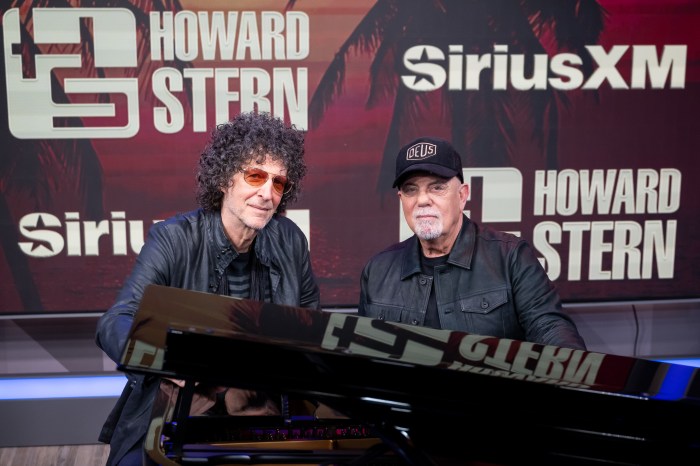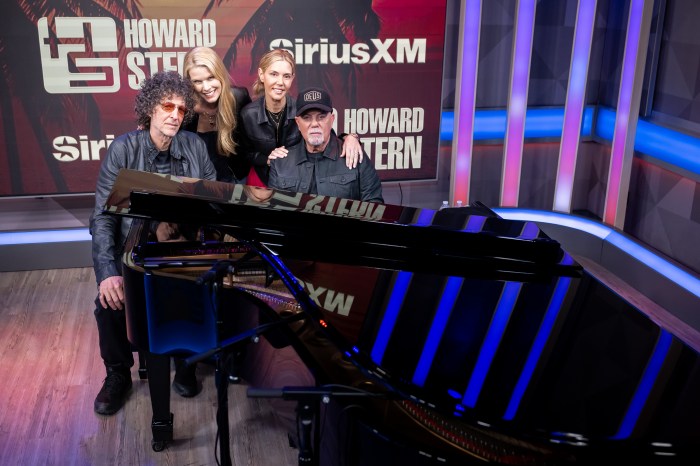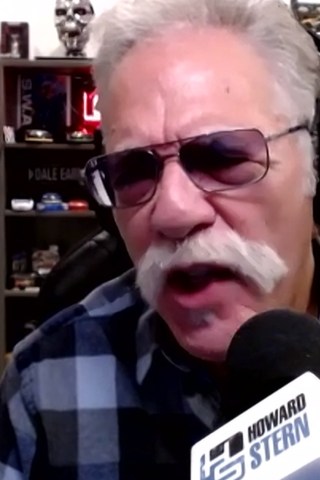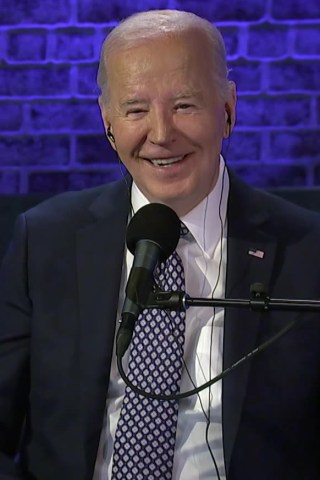Billy Joel on Writing New Music, Recording ‘We Are the World,’ and Forming a Supergroup With Paul McCartney and Jimmy Page
The Piano Man also opens up about sneaking into a Jimi Hendrix concert and how much it would take to buy his catalog
February 14, 2024Billy Joel is unquestionably one of the most successful solo artists in the history of rock ‘n’ roll. In addition to selling over 150 million records worldwide and dropping scores of chart-topping singles, the 74-year-old singer, songwriter, and pianist is also one of the highest-grossing tour artists ever. He’s sold millions of tickets and filled countless venues over the decades, but perhaps even more impressive is how long the Long Island native held a sold out residency at Madison Square Garden, which kicked off in 2014 and will conclude this July with his 150th performance. On Wednesday, however, while sitting down with Howard in SiriusXM’s Miami studios, the Piano Man revealed there was still one thing he hadn’t accomplished: He never formed a supergroup like Cream or Traveling Wilburys.
“I thought about putting together a band: me, Don Henley, and Sting, and maybe John Mayer on guitar,” Billy told Howard. “[But] everybody’s busy … You always say to the other guys, ‘Yeah, I’ll see you on the road. We’ll get together’ — and you never do it.’”
He will be getting together with Sting soon, at the very least. Later this month, Billy will embark on another stadium tour featuring Stevie Nicks, Rod Stewart, and Sting — the last of whom he considers to be one of his good friends, alongside fellow musicians Henley and Paul McCartney. Considering Billy and Sir Paul McCartney speak so frequently, Howard suggested he invite the Beatles legend to join his fledgling supergroup.
“He was in the super-est group of all-time,” Billy laughed. “I don’t have the nerve to do that. I can’t.”

Howard, who also has a connection with Macca, wondered if he could help. “You want me to say something to this guy?” he asked.
“You can say whatever you like. Go ahead,” Billy laughed.
Why stop there, Howard thought. “Who do you want as your drummer?” he asked.
“Ringo [Starr] would be good,” Billy said of Paul’s longtime bandmate. “He’s a great drummer. He doesn’t get the credit he deserves. He was phenomenal … He didn’t get in the way of the great writing and the novel productions they did — he played the right thing, which is sometimes the hardest thing to do.”
While Billy’s favorite guitarist Jeff Beck had recently passed away, he told Howard he would be happy to form a group with Led Zeppelin great Jimmy Page instead. “He’s a great musician,” Billy said of Page performing the iconic intro to Led Zeppelin’s “Kashmir.” “Brilliant music.”
“What a band I’m putting together,” Howard laughed. “If I pull this off, it will be the greatest accomplishment of my life.”
“Yeah, good luck Chuck,” Billy laughed.
Just What the Doctor Ordered
When Billy released “Turn the Lights Back On” earlier this year – his first single in 17 years – there was much speculation about the song’s meaning. In reality, it’s a reaction to French singer Édith Piaf’s “Non, je ne regrette rien,” which translates to “No, I do not regret anything.”
“Anybody who’s really lived must have regrets,” he countered. “I mean, I owe a thousand apologies to thousands of people – I have lots of regrets … so I wanted to respond to it.”
Many music legends have tried to get Joel to make new music, but it was a loose connection to producer Freddy Wexler that got him out of retirement. “His doctor knew my doctor … I thought I’d do something for the doctor,” he told Howard of agreeing to meet Wexler at a restaurant before realizing he’s more than just a fan. “All of a sudden, I recognize this guy knows what he’s talking about.”
Even so, Billy hadn’t intended to put out something new. “I put myself through the gristmill doing this and it’s a torturous process because I have a high bar and, if it’s not good enough, I’m not going to write it,” he said before admitting the producer at least got the wheels turning. “One way or the other, he got me to think about working together with him.”
Eventually, Joel sent Wexler a demo of unfinished work, which eventually led to the idea of “Turn the Lights Back On.” “This is an interesting vocal for me … I never like my own voice – I’m always disappointed,” the star told Howard as he listened back to the track. “I actually heard the vocal on this recording and I didn’t hate it … that’s one of the first times that’s ever happened to me.”
Though Joel wouldn’t say specifically whom he was writing about, he did offer some insight. “There’s a double meaning. Part of it is about a relationship and part of it is about my own life,” he explained. “I’m putting out a new record … do I get a second chance here?”
Howard wondered if the new track meant a new album down the road.
“Anything’s possible,” the Billy offered. “I’m now open to collaborating with other writers.”
Sodomy Is Such a Lonely What Now?
As Billy explained to Howard, he’ll occasionally go into the studio with one idea, and it will turn into something completely different. Case in point: “Movin’ Out (Anthony’s Song)” from 1977’s “The Stranger.” When he brought the original melody and chords to his band, they noticed it sounded very similar to a Neil Sedaka song. “They’re looking at me like I have 10 heads,” he recalled before adding they told him in a rather gruff manner. “They said, ‘Hey, shithead, that’s “Laughter in the Rain” by Neil Sedaka.’”
He was initially annoyed. “‘You mean I’ve gotta write a whole new song?’” he remembered thinking before realizing he could keep the original words. “I was like, ‘Wait a minute, I’m not going to write a whole new set of lyrics and a whole new song. I’m going to use those lyrics on a different melody.’”
A more extreme example is “Honesty” — the third single off of 1978’s “52nd Street.” During the recording sessions for that album, Joel came to the studio with a melody idea that the band liked. His drummer at the time, Liberty DeVitto, was inspired. “He goes, ‘Yeah, I like it — it could be ‘Sodomy’,’” he remembered the percussionist suggesting. “I think we actually recorded it somewhere with me singing ‘sodomy’ originally.”
With the clock ticking on an expensive studio booking and a melody that everyone liked, the word was swapped with something more digestible. “I said, ‘You know what fits? “Honesty.”’ Then I wrote the lyrics right there and then,” the songwriter told Howard.
What’s Billy Joel’s Favorite Billy Joel Song?
Some prolific artists have trouble naming their favorite song, but not Billy. When Howard played the ballad “And So It Goes,” which was released on 1989’s “Storm Front,” Billy didn’t hold back. “That’s my top song now,” he declared.
That doesn’t mean it came easy to him. “It was very emotional writing this song … my heart was broken,” Joel revealed before adding the music dictated the mood. “It had to be about a broken heart … there’s sadness in something that should be sweet …. It’s a sour note.”
Based on real events, the song chronicles a relationship that isn’t meant to be. “It wasn’t going to work out and it didn’t work out,” Joel said. “We were mismatched … she went off to be a model in Europe and she became very successful … when she came back from Europe it just wasn’t going to happen … I saw it coming.”
After the chords were in place, the words started to form. “I knew that the opening line was going to be very important, and a word like ‘sanctuary’ has a good resonance to it,” Billy remarked before revealing he’d wanted to use the word for some time. “It was in my notebook — I said, ‘We’ve got to find a place for this.’”
Hey Joel, Where You Going With That Gear in Your Hand?
Billy has long idolized Jimi Hendrix, so it’s no surprise he wanted to see him in concert when the guitar virtuoso passed through Flushing Meadows back in the late ‘60s, but it turned out to be no easy task. “We didn’t have money to buy tickets,” Joel told Howard, explaining he was just 18 or 19 at the time.
So, he tried a different approach.
“I bullshitted my way in — I got some cables, I put on an outfit that looked like a roadie, and I had, like, equipment with me,” he said, explaining he even donned a fake British accent to convince security he was part of the crew. “I’m dragging stuff in [like], ‘This has got to get to the stage … Get the fuck out of the way, Jimi’s gotta have this.’”
The ruse worked, but it wasn’t long before he was noticed by Jimi’s real-life head roadie, Keith Robertson. “‘Hey you, you’re pretty good. You’re gonna help us load the amps,’” Billy recalled the legendary roadie saying before putting him to work dragging gigantic Marshall amps onto the stage. “The thrill! I got to set up his stuff,” Joel continued, adding, “I actually got to sit on stage while Jimi Hendrix was playing his concert.”
Howard wondered what made Jimi so special.
“Everything about him was new and different and radical and great … His touch on the guitar was so fluid, and he played upside down, left-handed guitar – how do you do that?” Billy marveled. “He broke all the rules. He was in his own musical land. It was amazing.”
A few decades later, Joel channeled the trailblazing rocker while writing his 1989 album “Storm Front.” “The song I wrote was ‘Shameless.’ I was thinking of Jimi Hendrix singing and playing,” Billy told Howard before performing a few bars in character as Jimi.
Looking Back at ‘We Are the World’
Nearly 40 years after its initial release, music lovers can’t get enough of the star-studded 1985 single “We Are the World.” Featuring artists ranging from Stevie Wonder, Bruce Springsteen, and Michael Jackson to Tina Turner, Willie Nelson, and of course Billy, the song raised over $80 million for charitable causes at the time and was, more recently, the subject of a much-discussed Netflix documentary, “The Greatest Night in Pop.”
On Wednesday, Billy was all too happy to share his “We Are the World” recollections with Howard. “I was going to be in L.A. anyway … I said, ‘What the hell? This could be fun,’” he began. “Nobody knew what the song was going to be, and I’m standing next to Cyndi Lauper … and she’s going, ‘This song sounds like a Pepsi commercial.’”
“Funny things happened like Bob Dylan was shy to sing on his own. So, Steve Wonder comes out and he was telling people how to sing like Bob Dylan … and he was like, ‘Okay, I think I can do that,’” Joel continued. “That was a moment,” he added.
The recording session lasted most of the night, much to the consternation of several musicians involved, but Billy said he and Springsteen made the most of it. “Sometimes Bruce and I were in the chorus and sometimes we were not because there was a big pile of deli sandwiches on the other side of the room, and we kept going over to get a beer and a sandwich.”
LIVE FROM NEW YORK, IT’S A FIST FIGHT?
When Billy and his band made their “Saturday Night Live” debut in 1978, they pulled a bold move — they swapped one of their song selections without informing executive producer Lorne Michaels. “We were going to do … ‘Movin’ Out’ but we decided to do ‘Only the Good Die Young,’ which got [him] pissed off because ‘Only the Good Die Young’ was very controversial at the time,” the singer recalled.
But that was far from the most controversial thing to happen that evening. With original cast member Chevy Chase returning to guest host, he was rubbing some of the Not Ready for Primetime Players the wrong way backstage just minutes before showtime — even Jane Curtain was cursing him.
“This is going on right before the show is about to begin and we’re like, ‘These people are crazy, they’re going to go do a TV show now?’” Joel remembered thinking. “Somebody said something and then Bill Murray goes to punch [Chevy] … We’re like, ‘These guys are crazy. We think we’re crazy, these people are nuts.”
Sellin’ Out (Billy’s Catalog)
It’s hard to throw a guitar pick these days without hitting a Rock and Roll Hall of Famer who sold their publishing catalog for a fat nine-figure payday. In the past few years alone, Bob Dylan commanded $300 million, Fleetwood Mac’s Lindsey Buckingham sold his rights for $100 million, and the Boss sold his catalog for $500 million — and those are just three of Joel’s “We Are the World” collaborators.
But Billy has yet to cash in, which led Howard to wondering how much it might take.
“I would always consider a billion dollars,” Billy laughed.
“That’s not a crazy number,” Howard responded.

In truth, however, Joel seemed uncomfortable with the idea of handing over his song rights. “These are kind of like my kids,” he said. “I gave birth to these songs … and I brought them up, and I’m very attached to them—I have very, very strong feelings about the material I wrote—and to just sell them, it seems a little mercenary.”
The more likely outcome, he suspected, was that his family would manage his catalog long after he’s gone. “That can actually be lucrative in its own way. It’s a constant revenue stream,” Joel concluded.
“Turn the Lights Back On” is available now.
























